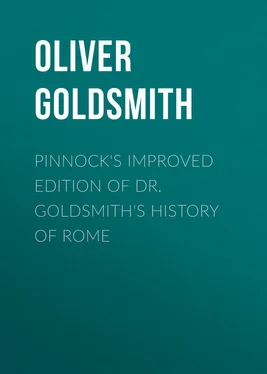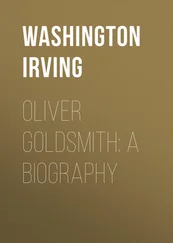Oliver Goldsmith - Pinnock's improved edition of Dr. Goldsmith's History of Rome
Здесь есть возможность читать онлайн «Oliver Goldsmith - Pinnock's improved edition of Dr. Goldsmith's History of Rome» — ознакомительный отрывок электронной книги совершенно бесплатно, а после прочтения отрывка купить полную версию. В некоторых случаях можно слушать аудио, скачать через торрент в формате fb2 и присутствует краткое содержание. Издательство: Иностранный паблик, Жанр: foreign_antique, foreign_prose, на английском языке. Описание произведения, (предисловие) а так же отзывы посетителей доступны на портале библиотеки ЛибКат.
- Название:Pinnock's improved edition of Dr. Goldsmith's History of Rome
- Автор:
- Издательство:Иностранный паблик
- Жанр:
- Год:неизвестен
- ISBN:нет данных
- Рейтинг книги:4 / 5. Голосов: 1
-
Избранное:Добавить в избранное
- Отзывы:
-
Ваша оценка:
- 80
- 1
- 2
- 3
- 4
- 5
Pinnock's improved edition of Dr. Goldsmith's History of Rome: краткое содержание, описание и аннотация
Предлагаем к чтению аннотацию, описание, краткое содержание или предисловие (зависит от того, что написал сам автор книги «Pinnock's improved edition of Dr. Goldsmith's History of Rome»). Если вы не нашли необходимую информацию о книге — напишите в комментариях, мы постараемся отыскать её.
Pinnock's improved edition of Dr. Goldsmith's History of Rome — читать онлайн ознакомительный отрывок
Ниже представлен текст книги, разбитый по страницам. Система сохранения места последней прочитанной страницы, позволяет с удобством читать онлайн бесплатно книгу «Pinnock's improved edition of Dr. Goldsmith's History of Rome», без необходимости каждый раз заново искать на чём Вы остановились. Поставьте закладку, и сможете в любой момент перейти на страницу, на которой закончили чтение.
Интервал:
Закладка:
9. The Roman theatre was formed after the model of the Greeks, but never attained equal eminence. The populace always paid more regard to the dresses of the actors, and the richness of the decoration, than to ingenious structure of plot, or elegance of language. Scenic representations do not appear to have been very popular at Rome, certainly never so much as the sports of the circus. Besides comedies and tragedies, the Romans had a species of drama peculiar to their country, called the Atellane farces, which were, in general, low pieces of gross indecency and vulgar buffoonery, but sometimes contained spirited satires on the character and conduct of public men.
10. We should be greatly mistaken if we supposed that the theatres in ancient Rome at all resembled those of modern times; they were stupendous edifices, some of which could accommodate thirty thousand spectators, and an army could perform its evolutions on the stage. To remedy the defects of distance, the tragic actors wore a buskin with very thick soles, to raise them above their natural size, and covered their faces with a mask so contrived as to render the voice more clear and full. 47 47 Hence the mask was called persona , from personare , to sound through. From persona the English word person is derived, which properly signifies not so much an individual, as the aspect of that individual in relation to civil society.
Instead of the buskin, comic actors wore a sort of slipper called a sock.
11. The periodical festivals of the Romans were celebrated with theatrical entertainments and sports in the circus at the public expense. The most remarkable of these festivals was the secular, which occurred only at periods of one hundred and ten years. The others occurred annually, and were named from the gods to whose honour they were dedicated.
12. The Romans were a more grave and domestic people than the lively Greeks; their favourite dress, the toga or gown, was more formal and stately than the Grecian short cloak; their demeanour was more stern, and their manners more imposing. The great object of the old Roman was, to maintain his dignity under all circumstances, and to show that he could controul the emotions to which ordinary men too readily yield. Excessive joy or grief, unqualified admiration, or intense surprise, were deemed disgraceful; and even at a funeral, the duty of lamenting the deceased was entrusted to hired mourners. Temperance at meals was a leading feature in the character of the Romans during the early ages of the republic; but after the conquest of Asia, their luxuries were more extravagant than those of any nation recorded in history. But there was more extravagance than refinement in the Roman luxury; and though immense sums were lavished on entertainments, they were destitute of that taste and elegance more delightful than the most costly delicacies.
13. The Roman ladies, enjoyed more freedom than those in any other, ancient nation. They visited all places of public amusement uncontrolled, and mingled in general society. The power of the husband, however, was absolute, and he could divorce his wife at pleasure without assigning any cause. In the early ages of the republic this privilege was rarely exercised, and the Roman ladies were strictly virtuous; but at a later period divorces were multiplied, and the most shocking depravity was the consequence.
Questions for Examination .
1. What were the national amusements of the Romans?
2. What were the naumachiæ?
3. Whence arose the custom of gladiatorial combats?
4. Why were these exhibitions of frequent occurrence?
5. How was the supply of gladiators kept up?
6. From what circumstances do we learn the great numbers of the gladiators?
7. What names were given to the gladiators?
8. How were these combats terminated?
9. What pieces were exhibited on the Roman stage?
10. How did the dramatic entertainments in Rome differ from those of modern times?
11. Which were the most remarkable Roman festivals?
12. What was the general character of the Roman people?
13. How were women treated in Rome?
CHAPTER X.
GEOGRAPHY OF THE EMPIRE AT THE TIME OF ITS GREATEST EXTENT
The Roman eagle seized
The double prey, and proudly perch'd on high
And here a thousand years he plumed his wing
Till from his lofty eyry, tempest-tost,
And impotent through age, headlong he plunged,
While nations shuddered as they saw him fall. — Anon.
1. The ordinary boundaries of the Roman empire, over which, however, it sometimes passed, were, in Europe, the two great rivers of the Rhine and Danube; in Asia, the Euphrates and the Syrian deserts; in Africa, the tracts of arid sand which fence the interior of that continent. It thus contained those fertile and rich countries which surround the Mediterranean sea, and constitute the fairest portion of the earth.
2. Beginning at the west of Europe, 48 48 The student will find the particulars of the ancient state of these countries detailed more fully in Mitchell's Ancient Geography.
we find, first, Hispa'nia, Spain . Its boundaries are, on the east, the chain of the Pyrenees; on every other side, the sea. It was divided into three provinces: 1. Lusita'nia, Portugal , bounded on the north by the Du'rius, Douro , and on the south by the Anas; Guadiana : 2. Bo'etica, bounded on the north and west by the A'nas, and on the east by the mountains of Orospe'da, Sierra Moreno : 3. Tarracone'nsis, which includes the remainder of the Spanish peninsula. 3. Spain was annexed to the Roman empire after the conclusion of the second Punic war; Lusitania, after a desperate resistance, was added at a later period.
4. Transalpine Gaul was the name given to the entire country between the Pyrenees and the Rhine; it consequently included France, Switzerland, and Belgium.
5. Gaul was divided in four provinces: 1. Narbonen'sis or Bracca'ta, bounded on the west by the Pyrenees; on the north by the Cevennian mountains, and on the east by the Va'rus, Var : 2. Lugdunen'sis or Cel'tica, bounded on the south and west by the Li'ger, Loire ; on the north by the Sequa'na, Seine , and on the east by the A'rar, Saone : 3. Aquita'nica, bounded by the Pyrenees on the south, and the Li'ger on the north and east: 4. Bel'gica, bounded on the north and east by the Rhe'nus, Rhine; on the west by the Arar, and on the south by the Rhoda'nus, Rhone , as far as the city Lugdu'num, Lyons . Helve'tia, the modern Switzerland, was included in Belgic Gaul. This extensive country was not totally subdued before the time of Julius Cæsar.
6. Italy has been already mentioned in the first chapter; we shall therefore pass it over and come to the islands in the Mediterranean.
Sici'lia or Trinac'ria, Sicily , was the first province that the Romans gained beyond the confines of Italy. The cities on its coast were founded by Phoenician and Grecian colonies, but the native inhabitants retained possession of the interior; one tribe, named the Sic'uli, are said to have migrated from Italy, and to have given their name to the island. The Greeks and Carthaginians long contended for supremacy in this island, but it was wrested from both by the Romans towards the close of the second Punic war. Nearly at the same time, the islands of Corsica and Sardinia were annexed to the empire.
7. Britan'nia, divided into Britan'nia Roma'na, which contained England and the south of Scotland; and Britannia Bar'bara or Caledo'nia, the northern part of Scotland, into which the Romans never penetrated. Britain was first invaded by Julius Cæsar, but was not wholly subdued before the time of Nero. As for Hiber'nia or Ier'ne, Ireland , it was visited by Roman merchants, but never by Roman legions.
Читать дальшеИнтервал:
Закладка:
Похожие книги на «Pinnock's improved edition of Dr. Goldsmith's History of Rome»
Представляем Вашему вниманию похожие книги на «Pinnock's improved edition of Dr. Goldsmith's History of Rome» списком для выбора. Мы отобрали схожую по названию и смыслу литературу в надежде предоставить читателям больше вариантов отыскать новые, интересные, ещё непрочитанные произведения.
Обсуждение, отзывы о книге «Pinnock's improved edition of Dr. Goldsmith's History of Rome» и просто собственные мнения читателей. Оставьте ваши комментарии, напишите, что Вы думаете о произведении, его смысле или главных героях. Укажите что конкретно понравилось, а что нет, и почему Вы так считаете.











